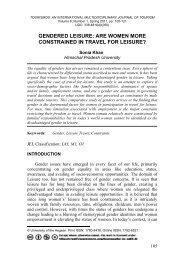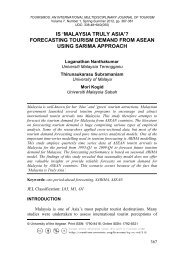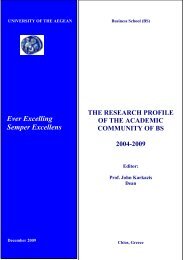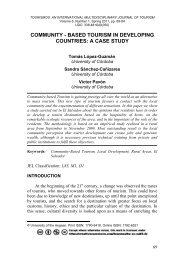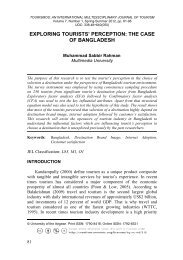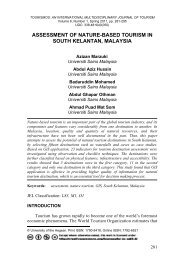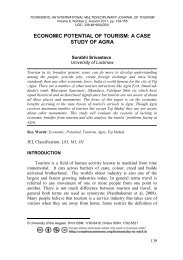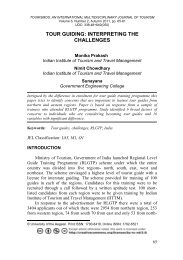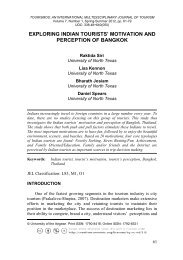TOURISMOS is an international, multi-disciplinary, refereed (peer ...
TOURISMOS is an international, multi-disciplinary, refereed (peer ...
TOURISMOS is an international, multi-disciplinary, refereed (peer ...
Create successful ePaper yourself
Turn your PDF publications into a flip-book with our unique Google optimized e-Paper software.
Hatice Güçlü Nergiz, Meryem Akoğl<strong>an</strong> Kozak & Sabah Balta<br />
levels. According to Kohlberg, the individual <strong>is</strong> in a dilemma while s/he<br />
makes a moral judgement in a case s/he faces <strong>an</strong>d s/he creates h<strong>is</strong>/her<br />
moral underst<strong>an</strong>ding by the moral reactions that s/he will give to these<br />
dilemmas (C<strong>an</strong>, 2003, p. 128). Hence, in preconventional level, there<br />
ex<strong>is</strong>ts pun<strong>is</strong>hment <strong>an</strong>d obedience. The individual obeys the rules not<br />
because s/he believes the rightness of the rules but in order not to be<br />
pun<strong>is</strong>hed. (C<strong>an</strong>, 2003, p. 130). On conventional level, the expectations of<br />
the family, friend groups or the individuals social environment holds a<br />
value in themselves. Th<strong>is</strong> level c<strong>an</strong> be defined as the others’ expectation<br />
of social accept<strong>an</strong>ce. At th<strong>is</strong> level, the individual’s moral inferences<br />
emerge within the framework of mutual expectations in interpersonal<br />
relations (C<strong>an</strong>, 2003, p. 131). At the postconventional level, “the<br />
individual tries to define the moral values <strong>an</strong>d principles having validity<br />
<strong>an</strong>d applicability independent from the authorities of the groups or the<br />
people putting them forth <strong>an</strong>d the identification of the individual with<br />
these groups” (Kağıtçıbaşı, 2005, p. 335).<br />
Ferrel <strong>an</strong>d Gresham’s (1985) Probability Model in Ethical Dec<strong>is</strong>ion-<br />
Making occurs at different levels. Realizing the ethical problem<br />
constitutes the first level. Then, the shaping of ethical or non-ethical<br />
behavioural activities within the framework of reasoning, individual’s<br />
motivations <strong>an</strong>d desires <strong>is</strong> in effect according to deontological <strong>an</strong>d<br />
teleological theories (Cavuşgil, 2007, p. 453).<br />
The m<strong>an</strong>agers often come across complicated ethical dec<strong>is</strong>ions<br />
during org<strong>an</strong>izational work. The dec<strong>is</strong>ions made in th<strong>is</strong> situation depend<br />
on the number of elements related with the <strong>is</strong>sue <strong>an</strong>d the ethical theory<br />
that the m<strong>an</strong>ager adopted. “In businesses, dec<strong>is</strong>ion makers while<br />
developing ethical dec<strong>is</strong>ion making processes, are partly affected by<br />
different views, their own benefits <strong>an</strong>d bal<strong>an</strong>cing their own views with<br />
others" (Özgener, 2004, p. 117).<br />
In the Ethical Dec<strong>is</strong>ion-Making model developed by Hunt <strong>an</strong>d Vitell<br />
(1986), the dec<strong>is</strong>ion-making process evolves from the identification of the<br />
problem in terms of reasonable rules, to the research, evaluation, choice<br />
<strong>an</strong>d lastly the result. In ethical dec<strong>is</strong>ion-making, cultural, industrial <strong>an</strong>d<br />
org<strong>an</strong>izational environment <strong>an</strong>d the personal experiences of the individual<br />
are influential. The starting point of the dec<strong>is</strong>ion-making process <strong>is</strong> the<br />
individual’s identifying the problem around him by realizing its ethical<br />
dimension (Harr<strong>is</strong> <strong>an</strong>d Sutton, 1995, p. 806). Then, the dec<strong>is</strong>ion <strong>is</strong> made<br />
by evaluating the alternatives according to the adopted ethical theory.<br />
If the other studies on ethical dec<strong>is</strong>ion-making process are evaluated<br />
with a collective point of view, the following results c<strong>an</strong> be inferred: In<br />
terms of ethical dec<strong>is</strong>ion-making process of the individuals; the<br />
90



